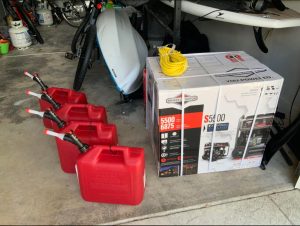
Home standby generator systems and portable generators are the two most common types of backup power solutions homeowners choose. Both keep power flowing to a home during a power outage, but in differing ways. A portable generator is an immediate but temporary solution powered by gasoline, while a home standby generator is an automatic, permanent backup power solution powered by natural gas or liquid propane.
Standby vs. Portable
- A standby generator is permanently installed outside the home similar to a central air conditioning unit, while a portable generator can be moved from location to location.
- A standby generator runs on natural gas or propane and hooks up to existing gas lines. A portable generator must be filled with gasoline every few hours. As many gas stations will not be able to pump gas during the outage, gasoline needs to be stored and rotated to last through the outage (approximately 70 gallons of gasoline would be needed for a five-day outage.) In addition, the oil must be frequently changed, especially if running continuously.
- A standby generator is fully enclosed, while a portable generator has exposed engine parts, which are often very hot.
- Standby generators turn on automatically when the power shuts off. A transfer switch constantly monitors utility power and transfers the electrical load to the generator if power is lost, protecting the home even if the home owner is away. A portable generator must be manually started and stopped – meaning the homeowner must be home during a power outage.
- A standby generator can power critical and sophisticated appliances and systems in your home, including lights, heating/cooling systems, refrigerators, sump pumps, home security systems and more. If using a portable generator, appliances need to be plugged-in to the unit using extension cords. The extension cords must be rated for the electrical and distance they run to the portable generator outdoors. (A portable generator must never be run indoors due to carbon monoxide risks.) Any items that are hardwired to the home, such as heating/cooling systems, security systems, etc., cannot be powered by a portable generator.
- A standby generator delivers clean, consistent power, which is important for sophisticated electronics like big-screen TVs, computers, etc. Some portable generators provide lower-grade power quality, which can damage and degrade sensitive electronics.
- Standby generators are installed professionally in advance of an event and provide safe, “hands-off” operation for the homeowner. Portable generators must be operated by the homeowner under the duress of an unexpected outage. This can lead to the necessary safety precautions being overlooked.
- Portable generators typically have decibel ratings starting around 68dB and go as high as 85dB. For comparison purposes, most home central air conditioning units operate between 65dB to 70dB. An air-cooled home standby generator falls into the same range as the central A/C unit with most measuring 67dB to 68dB. Some liquid-cooled generators are exceptionally quiet. You can hear the birds chirping while standing within a few feet of them.
So how do you choose? For most homeowners, a home standby generator makes the most sense. No fuel to store and rotate. Weather is not a concern. Automatic operation ensures the sump pump runs when it must and the refrigerator stays cold. No one has to hook up the portable and get it started or keep it fueled during inclement weather.
The process of choosing a generator starts with knowing just how much power a home requires. Quite often, different homeowners with similar sized homes choose very different generators. Generac offers both a portable generator sizing guide (https://www.generac.com/portable-sizer) and an automatic standby generator sizing guide (https://www.generac.com/for-homeowners/home-backup-power/build-your-generator) for different types of generators. Generac’s quick and easy calculators will provide you with possible generators to fit your needs, along with estimated installation costs, and financing options. Just provide your zip code and how much of your home you want to back up (all of it or just selected appliances), and the calculator will do the rest!